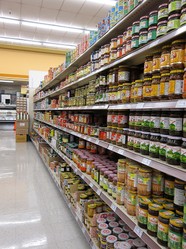If you are an animal lover and/or pet owner, the days when you could just open a bag of cat or dog food, throw it into a bowl and be done with it are long gone. Today, there seems to be as many food choices for pets as there are for humans.
That’s not an accident. Estimates of the sales of pet products and services in 2014 are will exceed $58 billion in the U.S., according to the American Pet Products Manufacturers Association. More than $21 billion of that was for food. Compare that to 1996 when total pet spending was just $21 billion. Our pets are eating well and being cared for in every conceivable way.

Pet Lovers And “Natural” Pet Food – What Does It Really Mean?
Pet food - what does "natural" and other descriptions really mean?
Great Pet Meals
Pet Food
 | Blue Buffalo Life Protection Formula Adult Dry Dog Food, Helps Build and Maintain Strong Muscles,... Blue Buffalo Company, Ltd Only $14.98 |
 | Pedigree Complete Nutrition Adult Dry Dog Food, Grilled Steak & Vegetable Flavor, 18 lb. Bag Mars Petcare US Only $16.98 |
 | Meow Mix Original Choice Dry Cat Food, 6.3 Pound Bag The J.M. Smucker Co. Only $9.34 |
But, mixed into all the food and products that pamper our pets are a lot of confusing names for products, ingredients and other animal services. Sometimes the pet products’ descriptions have you wondering if they are referring to pets or people.
You’ll often see pet food described as “natural,” or “premium” or some other superlative. Get Out Your Dictionary When It Comes To Pet Food Descriptions
According to the U.S. Food and Drug Administration (FDA), pet food manufacturers compete by trying to make their products stand out among the many types of dry, moist, and semi-moist foods available. Pet food packaging carries such descriptive words as "senior," "premium," "super-premium," "gourmet," and "natural." These terms, however, have no standard definition or regulatory meaning.
So, what does “natural” really mean, if anything? Recently (2014) researchers from Colorado State University published an article in the Journal of Animal Science that tried to clarify what “natural” means when it comes to pet food. They found that the Association of American Feed Control Officials (AAFCO) defines “natural” as being, at least, food preserved with natural preservatives. It’s doubtful that the average pet owner would link “natural” and “preservatives” in the same sentence. Indeed, the study acknowledges that pet owners “may consider natural as something different than the regulatory definition.” They say that “the natural pet food trend has focused on the inclusion of whole ingredients, including meats, fruits, and vegetables; avoiding ingredients perceived as heavily processed, including refined grains, fiber sources and by-products; and feeding according to ancestral or instinctual nutritional philosophies.”
Dr. Kelly Swanson, an associate professor of animal and nutritional sciences at the University of Illinois, Urbana-Champaign, has written that the natural pet food segment is “the largest and fastest-growing segment [and has] almost doubled since 2005. In 2009 alone, some 250 new products were introduced with a natural claim.”
Clearly manufacturers have found a niche and they are heavily marketing it to entice pet owners to buy their products.
Making The Right Choice
But, how can pet owners make the right choice amidst all these confusing claims? The FDA’s Center for Veterinary Medicine is the federal agency tasked with regulating the industry and making sure the claims are legitimate. The fact that so many claims still proliferate the market may be a testament to the difficulty of the FDA’s task. Be that as it may, the FDA says pet food must carry certain information on their labels.
There are several basic things to look for on a pet food label, says the FDA. For example, look for the word “feeding” in the section of the label that says “life stage claim” within the nutritional adequacy section. This means the food was proven to be nutritionally adequate in tests of the food. Second, check the label for contact information such as the manufacturers phone name, phone number and address. Contacting the manufacturer should give you additional nutrient information not contained on the label (for proprietary reasons). Additional information about ingredients is available at the FDA's website (fda.gov).
Does this answer the ‘what is natural’ question? Not quite. The definition is still elusive.
The AAFCO’s statement went on to say “natural [is a] feed or ingredient derived solely from plant, animal or mined sources, either in its unprocessed state or having been subjected to physical processing, heat processing, rendering, purification extraction, hydrolysis, enzymolysis or fermentation, but not having been produced by or subject to a chemically synthetic process and not containing any additives or processing aids that are chemically synthetic except in amounts as might occur unavoidably in good manufacturing practices.” Quite a mouthful, right? Not something the average pet food purchaser is likely to understand.
Veterinarian T. J. Dunn, writing for PetMD, says “until everyone agrees on what exactly the term ‘natural’ means as relating to pet food, you must be guided by your best judgment. It is also important that you are not fooled by key words or gimmicks. Carefully real the label of the food you are considering and use some common sense.”
You might also like
Grocery Product Placement May Be Costing You MoneySlotting Fees are a hidden cost that may boost what you pay to fill up your m...





 The Problem With Wizzley and Amazon Associateson 10/17/2014
The Problem With Wizzley and Amazon Associateson 10/17/2014
 Happy Wife, Happy Life: Is It True?on 10/02/2014
Happy Wife, Happy Life: Is It True?on 10/02/2014
 Arborsculpture Designs Are Beautiful And Practicalon 09/30/2014
Arborsculpture Designs Are Beautiful And Practicalon 09/30/2014
 The Religious And Immoral Actson 09/23/2014
The Religious And Immoral Actson 09/23/2014


Comments
Revisiting your wizzley called to mind a question that I'd intended to ask the first time around.
Feline sentients appreciate chicken and fish, from what I've seen of acquaintances with cats and kittens. They eat them fresh and processed. For example, I knew a particularly frisky sentient who loved baked and fried chicken.
But labels generally list higher levels of mercury. Would it be healthier to set out canned salmon with the lowest preservatives and problematic inputs, such as mercury, or fresh salmon?
TheWritingCowboy, What are examples of "natural" preservatives in pet food?
I don't trust the word "natural" on any labels, for dogs or people. I don't have a dog, but I would ask my vet about a good food for them.